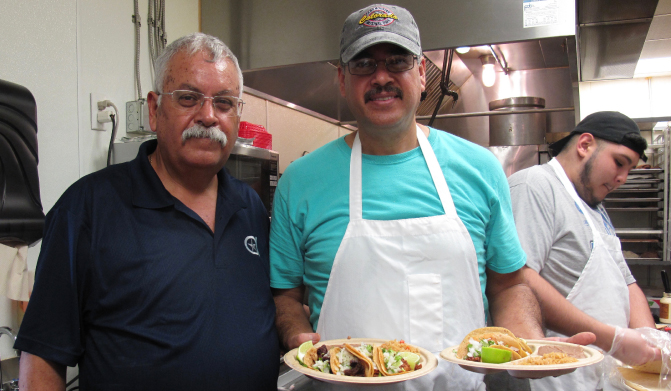The Arias family gatherings are about food. The tamales, roast pork, rice, beans and other foods served at birthday celebrations, Mother’s Day and weddings are the dishes Javier Arias and his seven siblings grew up eating in rural northern Mexico. Decades after moving to the United States, the 58-year-old construction project manager and his brothers continued their paternal grandfather’s tradition of killing the pigs and cows they barbecue.
“That’s what unites families,” said Javier. “Eating.”
Javier and his siblings are a tight-knit bunch. Starting in the 1970s, they followed each other to North Texas from their hometown of General Terán. But over the past nine years, food has been a source of conflict.
Back then, Aurelio Arias, the youngest of the clan, announced he was becoming a vegan, meaning he’d no longer eat meat or dairy. His wife Lily and their eldest son, Aurelio Arias Jr., became vegan about three years later. Aurelio’s sister Andrea Alaniz and mother became vegetarian, and Javier stopped drinking soda and started eating mostly fruits, beans and vegetables.
It was about getting healthier and living longer for their families, they said.
But their new food choices have come at the expense of family harmony. Holidays and weekend barbecues have never been the same. Relatives who still eat meat feel rejected when the siblings and their mother don’t eat the food they serve. Aurelio and Lily often offend relatives when they bring vegan dishes.
Aurelio and Javier have been left out of weddings and quinceañeras, the coming-of-age celebration when girls turn 15. Sometimes, they’ve chosen not to go.
Older brother Concepcion Arias said the separation hurts.
“I’ve grumbled about it because they can’t share in the experience [with everyone else],” said the 61-year-old father of five.
Javier Arias (far right) at the wedding of nephew Edgar Martinez before he changed his diet. (Photo courtesy of Javier Arias)
The Arias’ conflict doesn’t surprise two longtime food and culture historians who say the foods we eat are more than nourishment. They are loaded with meaning about love of family, friends, classes and heritage, the academics said.
“People do believe we pass along culture through food,” said Alice P. Julier, Ph.D., the director of the food studies program at Chatham University’s Falk School of Sustainability and the Environment. “Language often goes away. But food is something that people supposedly can maintain and celebrate.”
And eating the same foods together is one way people strengthen their heritage and relationships with relatives, said Amy Bentley, Ph.D., a professor of food studies at New York University’s Steinhardt School of Culture, Education, and Human Development. Changing what we eat — even if it’s for health reasons — could be interpreted as making a break from family unity, she said.
“Foodways, I think, is almost as prominent as religion, in terms of how people create ethnic and religious identity,” said Bentley, whose research has focused on food and American culture and society for more than two decades.
If the person has health problems, relatives give unconditional support, said Gomez. But, she said, if a family member makes a personal choice to stop eating foods the family has eaten for generations, they’re less accepting.
Aurelio was the first to change his diet, which had been heavy on beef and low on fruits and vegetables.
The 48-year-old restaurant owner quit eating meat and dairy after he was rushed to a hospital with chest pains. His blood pressure was dangerously high and he had to be hospitalized. He missed his father’s funeral as doctors monitored his heart.
Aurelio was no stranger to heart problems. His father had survived a heart attack, and his paternal grandfather’s stroke was linked to high blood pressure.
“I love my family and I didn’t want to die,” Aurelio said.
Aurelio and Lily Arias (center) with their sons Aurelio Jr. (left) and Aaron at the family’s restaurant and bakery, El Palote Panaderia. (Photo by American Heart Association News)
Back then, Javier also had health problems: high blood pressure, high cholesterol and diabetes. After seeing his younger brother’s health improve, Javier changed his eating habits.
Today, the brothers have each lost more than 60 pounds and their blood pressure and cholesterol are back to normal. Javier also no longer needs medication to control his diabetes.
Their sister Andrea changed the way she ate after medical exams showed she had a fatty liver.
Andrea Alaniz (center, kneeling) with husband Rogelio Alaniz (far left) and their children. (Photo courtesy of Andrea Alaniz)
“I was addicted to steaks,” said the 63-year-old mother of five. “That was one of my favorite vices.”
Andrea has encouraged her meat-eating siblings to try the tacos and enchiladas that Aurelio and Lily offer at their vegan Mexican restaurant. Some have come around.
But Concepcion still doesn’t support his family members’ meatless diet, despite having his own dietary restrictions to help manage his diabetes, high blood pressure, and high cholesterol.
The construction company owner gets sentimental when he talks about the family’s festive gatherings back when everyone ate the childhood dishes they loved.
“When people share in the same experience, it’s more fun, you have a more enjoyable time,” Concepcion said. “Life feels easier.”
